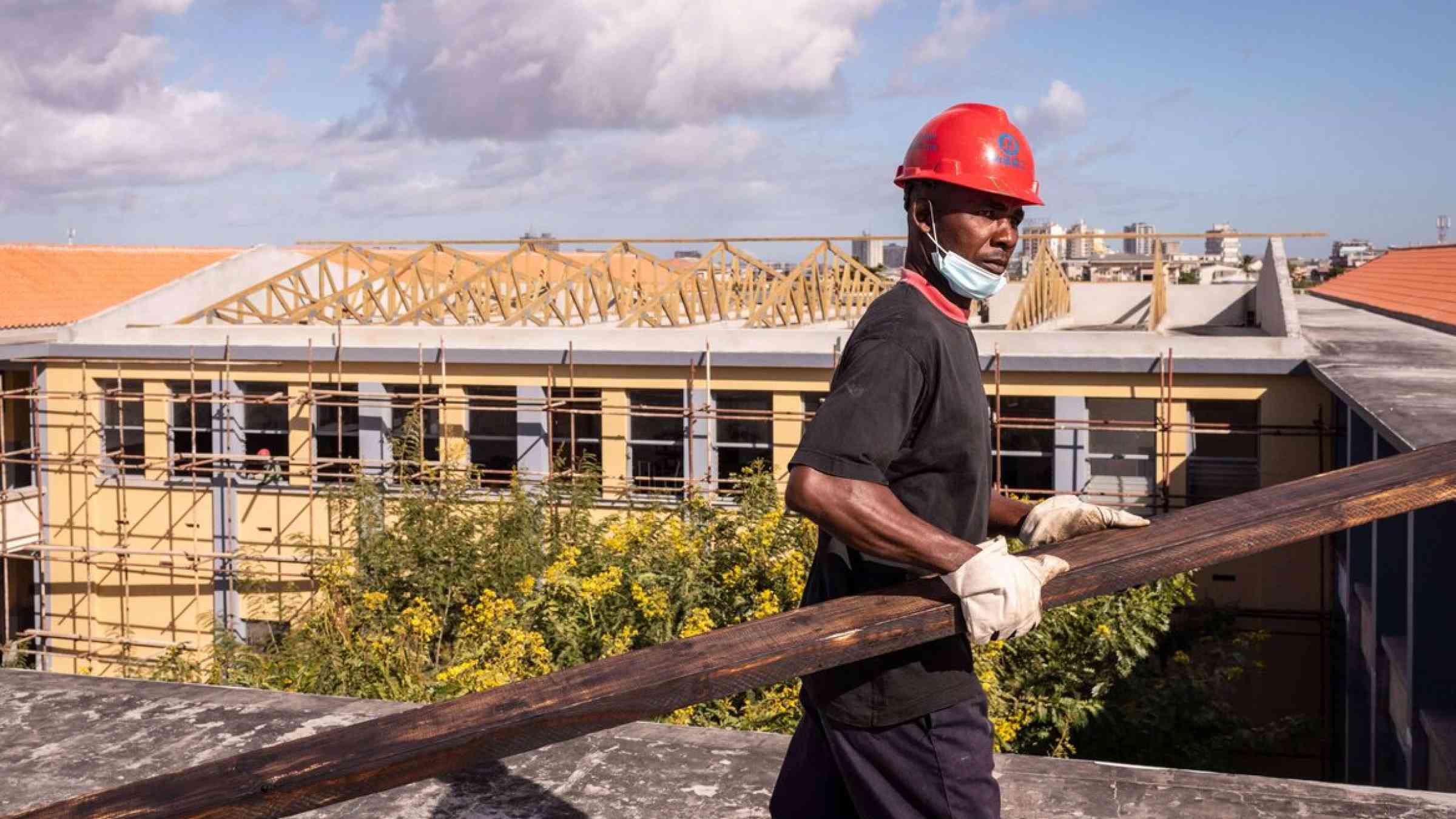Please help us improve PreventionWeb by taking this brief survey. Your input will allow us to better serve the needs of the DRR community.
In Mozambique, climate resilient infrastructures save lives and reduce the impact from disasters

Quelimane, Mozambique 26 March 2023: On 24 February 2023 Mozambique was hit by Cyclone Freddy which caused heavy rains and flooding in the country’s southern regions. Soon after, on 11 March 2023, Freddy made its second landfall in Mozambique, battering its central region with winds over 210km/h and intense rain, impacting strongly over Zambezia Province and its capital, Quelimane. Freddy caused enormous damage, bringing huge destruction of infrastructure and loss of livelihoods to many families.
However, across the affected areas climate-resilient infrastructure withstood and served their communities. In Zambezia, during the devastating storm, tens of schools made climate-resilient with the technical assistance of UN-Habitat, resisted, and sheltered thousands of people.
Abel Vieira Aide, Director of Lugela Primary School in Namacura Village, Zambezia Province, recalls, “Our School served as a safe shelter for our village. When we received the information about the cyclone through the local disaster risk management committees, we left the school’s door open so that everyone could come in. Today we appreciate the result of this work that we did together with UN-Habitat to make sure our schools can withstand disasters of this magnitude.”
What happened in Lugela, and in many other schools across Freddy-affected areas, demonstrates the significance of resilient infrastructure in disaster-exposed countries such as Mozambique. For the last 12 years, UN-Habitat has been working with the government of Mozambique on the Safer Schools Initiative to increase climate resilience of education facilities. The initiative included the development of key policy instruments such as the “Decree for Resilient Standards of Schools” which ensures that every school in the country is built according to climate-resilient standards. UN-Habitat is currently working with the National Institute for Disaster Risk Management (INGD) and the Ministry of Education and Human Development in providing technical assistance to make 3000 classrooms climate-resilient, in an effort supported by the World Bank.
The performance of climate resilient infrastructure was also shown by resilient houses built in Inhambane and Zambezia provinces. In Inhambane, hardly hit by the cyclone in its first round, 13 cyclone-proof houses built in 2011 with the technical assistance of UN-Habitat and the financial support of the European Commission Humanitarian Aid (ECHO), served as emergency shelter for 300 people. The cyclone-proof housing model was so successful that it was replicated locally, as explained by Zefanias Vilanculo, from Vilankulo Municipality, “we followed the same model to build a kindergarden, one state administration building, two schools and a health centre, which during the disaster, sheltered around 1440 people.”
In Icidua neighbourhood, in Quelimane, Zambezia, 12 climate resilient houses, built in 2018 with the support from USAID, resisted and served as emergency shelter for hundreds of people. Anabela Carlo, one of Icidua’s residents shared, “My house was destroyed by the cyclone, so I came to this house. I feel safe in this house as it looks strong. I hope the government help other people who are suffering and provide them with a safe house like this.”
Manuel Araujo, Quelimane’s Mayor, talking to UN-Habitat, a few days after Cyclone Freddy’s referred explicitly to the Icidua’s houses. “The cyclone left Icidua totally destroyed. Only the resilient houses stood there, like monuments, over a scenario of devastation”. For him, those houses are the way to go, “This kind of initiative should be replicated country-wide to make sure we build more resilient cities. Because we must learn how to live with climate change impacts”.
For the last two decades, UN-Habitat has been working with the government of Mozambique to advocate for resilient infrastructures that are inclusive and gender-sensitive, to address the challenges that climate change poses onto country's development. Building resilient infrastructure is a priority and the government aims at expanding resilient building standards, now adopted for schools, to other sectors such as housing and health.
Explore further
Please note: Content is displayed as last posted by a PreventionWeb community member or editor. The views expressed therein are not necessarily those of UNDRR, PreventionWeb, or its sponsors. See our terms of use
Is this page useful?
Yes No Report an issue on this pageThank you. If you have 2 minutes, we would benefit from additional feedback (link opens in a new window).